【FOCUS】Women Empowerment for an Inclusive Society
March 8th is International Women's day. Women play an essential role in creating human civilization and act as key promoters in social progress. In 2015, gender equality and women's empowerment were listed as important goals in the United Nations 2030 agenda for Sustainable Development. Over the years, cities worldwide have gradually empowered women and built inclusive societies by adopting various innovative initiatives. Today's In Focus will show you five initiatives of urban innovations that increase social inclusion by empowering women.
India,
Berhampur
Promoting
sustainable environment conservation and women empowerment through Faecal
Sludge and Septage Management (FSSM) in Berhampur, India
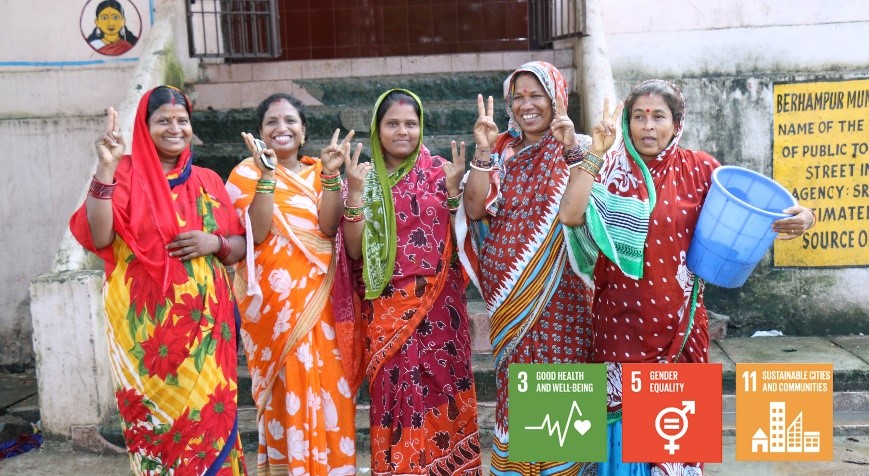
Berhampur is an ancient and densely populated city in Odisha province. Before 2017, the city did not have an underground sewer system, and the toilets were connected directly to septic tanks, thus disposal of faecal sludge, creating health and environmental challenges for the city.
In response, Berhampur passed a resolution to adopt the Faecal Sludge and Septage Management (FSSM) Regulations 2018, making it mandatory for all cesspool emptier vehicles to dispose faecal waste at the treatment plant. Over 700 women Self-Help Groups have been engaged in building sanitary toilets for safe containment of faecal waste, promoting mechanized emptying of septic tanks, operation and management of septage treatment plants and reusing of treated sludge.The initiative has enhanced the incomes of the collectives, ensured community participation and ownership for sustainable FSSM, and promoted women empowerment.
Learn more:http://www.guangzhouaward.org/a/1321.html?lang=en
Mezitli,
Turkey
Mezitli
Women Producers Market
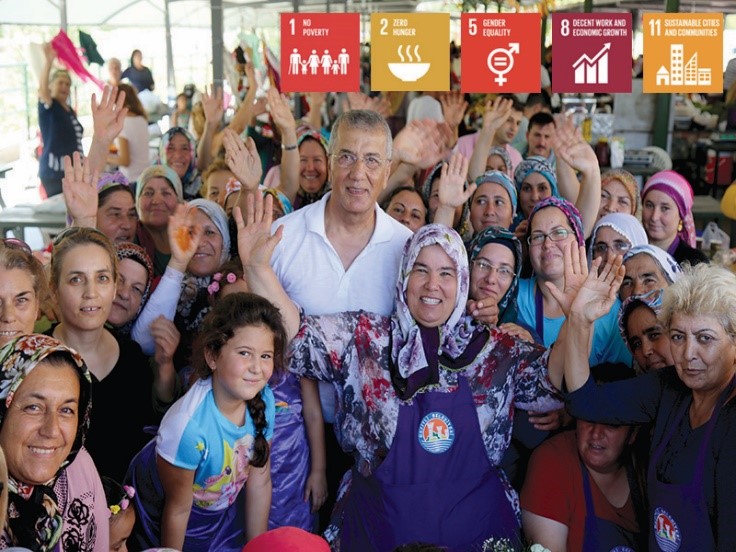
In Turkey, women are still one of the most vulnerable groups as they are often very much dependent on their families, and mostly on their male relatives or husbands. Therefore, the Women Producers Market is part of a general vision of Mezitli to be a women-friendly city and to encourage the local women to get more independent, thereby to increasing their self-confidence.
In doing so, Mezitli has set up the first market that women producers completely run. The initiative is supportive for local small-scale production and helps to strengthen local women as sellers, by providing them space and support to sell their local products, so as to encourage them to be economical actively in society.
This initiative’s outcome is already clearly visible, as it has increased the local employment rate and provided women with a platform to develop their economic existence, highly promoting gender equality in the city. In addition, the small-scale local economy has profited from this initiative. This means a more environmentally friendly economy and sustainable trade have been established, giving the whole city and its citizens a better quality of life.
Learn more: http://www.guangzhouaward.org/a/915.html?lang=en
Umea,
Sweden
The Gendered City Tour - Challenging Power in Cities
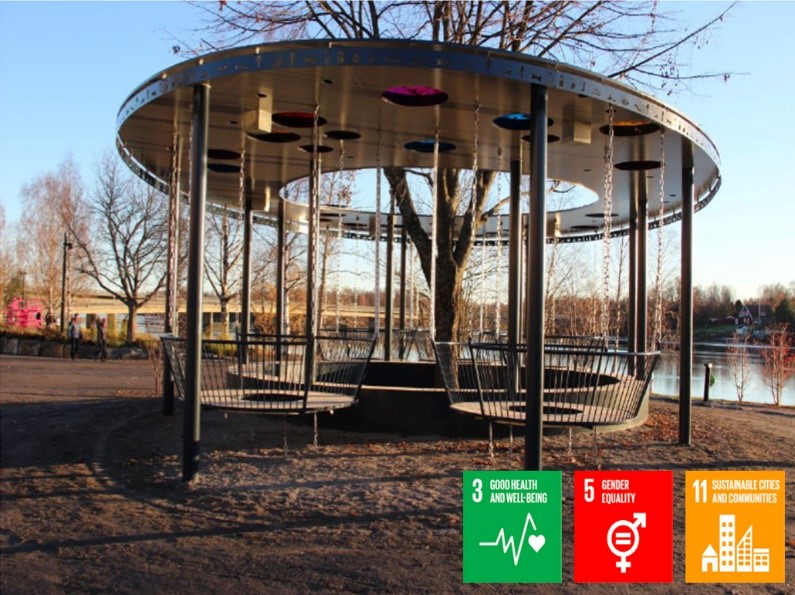
What do a bus station, a park, and a tunnel say about equality and gender issues? The Gendered landscape allows visitors to travel through the city of Umeå, a municipality that has worked broadly with issues of gender equality for a long time since 2009. At the local level, the gendered landscape approach contributes directly to the city council objectives of developing a growing sustainable, learning and gender-equal city with 200,000 inhabitants by 2050.
For instance, when passing in front of the biggest high school, visitors are informe that girls and boys make gender-typical choices in education. When passing in front of the hospital, the consequences of a gender-segregated labour market are highlighted. As the bus passes by parks, issues related to security and safety in public spaces are mentioned. Visitors also learn about a project aiming to get unemployed men to work in school kitchens while the bus drives by preschools.
The project aims to spread the knowledge about gender equality and Gendered landscape resistance to gender equality. Up to now, the Gendered landscape approach has also been emulated by other cities, such as Uppsala and Eskilstuna.
Learn more: http://www.guangzhouaward.org/a/936.html?lang=en
Santa
AnaCosta Rica
Santa
Ana en Cleta
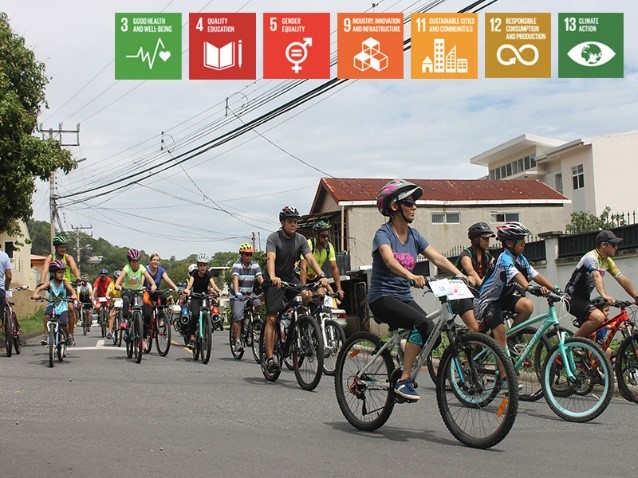
In order to reduce the use of private vehicles and improve road safety, Santa Ana designed a more inclusive mobility structure for pedestrians and cyclists in 2016. Santa Ana en Cleta is a project dedicated to transforming the mobility and road culture of the city's 57,000 inhabitants. The project also contributes towards the recovery of public spaces.
The project aims to improve the urban environment, well-being, health, the right to use the city safe, respectful, and sustainable way. It is focused on women, as women are the main agents of change in the communities. By teaching women how to ride a bike and how to use it as a means of transport, the project can promote the gradual inclusion of other population groups.
The project reverses the widespread perception that pedestrians and cyclists have fewer powers on the road and gives women more opportunities to use or allocate public space in the city.
Learn more: http://www.guangzhouaward.org/a/928.html?lang=en
Lüleburgaz,
Turkey
Sex,
Egalitarian Approach and Directives
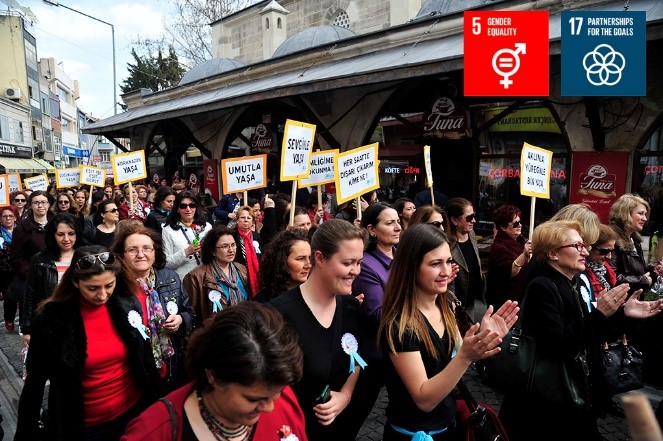
The Lüleburgaz Council's theory is that the status of women in society determines the status of the whole society. The goal is to move the city to one where every one is happy. If women are happy, families will be happy, which will translate to a happy citizenry. Whether women can be elected to work within the Municipal staff body is one of the hallmarks of democracy in the Municipality of Lüleburgaz.
The initiative benefit women and the community directly by giving greater visibility to women's leadership and encouraging women's participation in the Municipality. It has enabled women to go beyond their traditional role as home-makers and use their time and energies in ways that break traditional barriers. As Lüleburgaz transforms, the initiative is believed to be impacting many other areas. The number of women and the scope of their roles in public service has increased. This increase in public and private enterprises has spread into other services in the community. Female bank managers, female employers, female waitresses, cashier women, female clerks, and an observed increase in the number of female officers has appeared.


 In Focus | World Cities Day: People-Centred Smart Cities
In Focus | World Cities Day: People-Centred Smart Cities City Stories | Fostering community resilience: A lifeline for the Central African Republic
City Stories | Fostering community resilience: A lifeline for the Central African Republic In Focus | Innovative Education, Empowering Futures
In Focus | Innovative Education, Empowering Futures




















 Tel: +86 020 3780 4434
Tel: +86 020 3780 4434 Email: info@guangzhouaward.org
Email: info@guangzhouaward.org Adress: Unit 01-7, 28th Floor, No. 7, Chunrong 3rd Road, Tianhe District, Guangzhou, Guangdong, 510000, PRC
Adress: Unit 01-7, 28th Floor, No. 7, Chunrong 3rd Road, Tianhe District, Guangzhou, Guangdong, 510000, PRC




